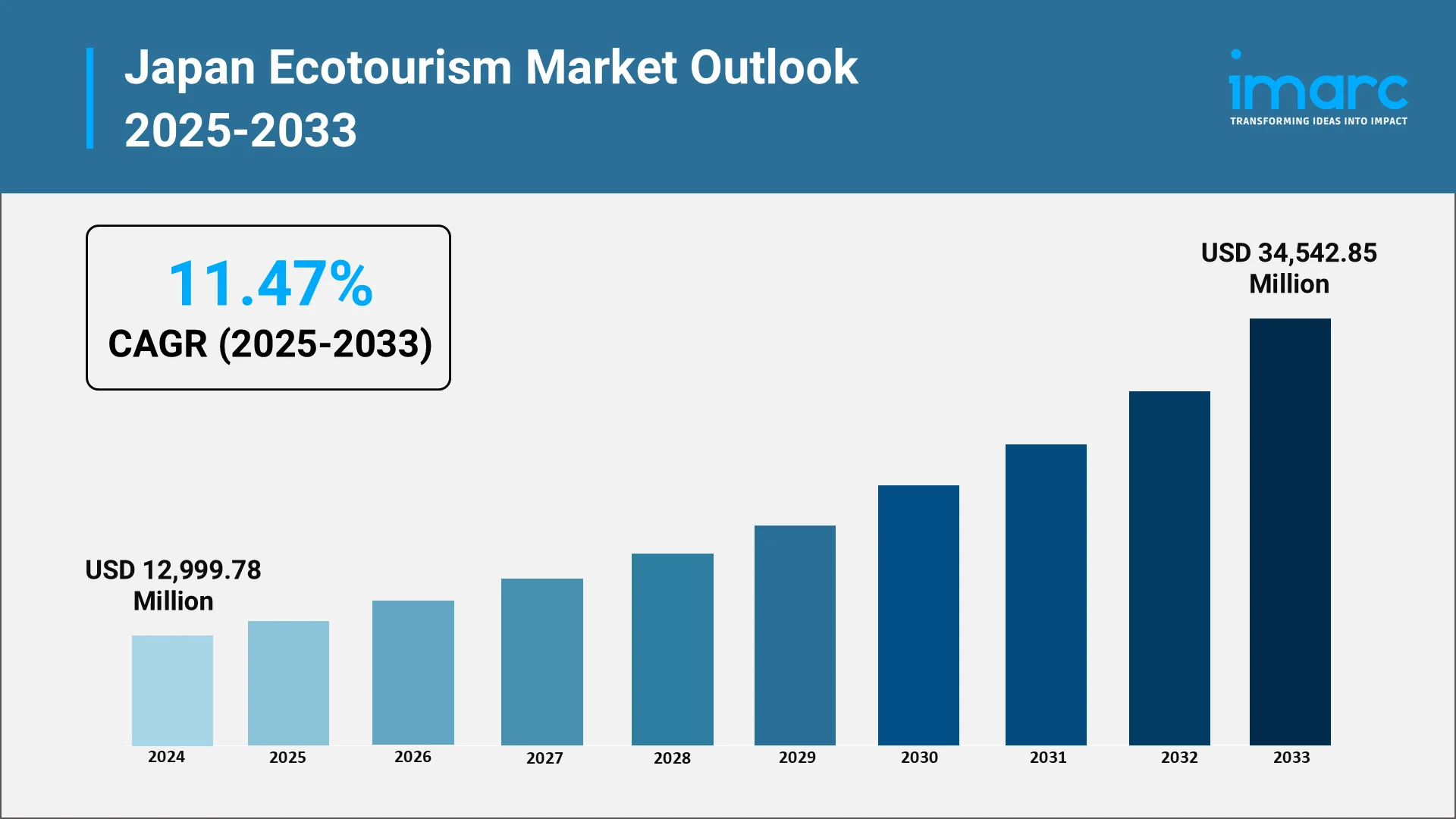Japan’s ecotourism industry is experiencing a remarkable transformation, positioning the country as Asia’s leading destination for sustainable travel experiences. The market, which is reaching unprecedented valuations of USD 12,999.78 Million in 2024, is demonstrating exceptional growth momentum with projections indicating an expansion to USD 34,542.85 Million by 2033, representing a robust compound annual growth rate (CAGR) of 11.47% during the 2025-2033 period. This explosive growth is reflecting Japan’s strategic pivot toward responsible tourism, combining the nation’s rich cultural heritage with cutting-edge environmental consciousness.
The transformation is manifesting across multiple dimensions of the travel experience. The Japan National Tourism Organization (JNTO) and the Japan Tourism Agency (JTA) report that roughly 36.9 million international visitors traveled to Japan in 2024, exceeding the former high of 31.9 million set in 2019 by around 16%. Additionally, overall expenditures by incoming tourists hit a record peak of about JPY 8.1 trillion (USD 53.3 billion), with per capita spending estimated to be roughly JPY 227,000 (USD 1,493). This surge is highlighting Japan’s enduring appeal as travelers worldwide are increasingly prioritizing destinations that are offering authentic, nature-based experiences while minimizing environmental impact.
The demographic profile of ecotourists visiting Japan is particularly noteworthy. Millennials are representing the largest market segment, driven by their heightened environmental awareness and desire for experiential travel. This cohort is actively seeking destinations that are aligning with their eco-conscious values, and Japan is meeting this demand through carefully curated sustainable tourism offerings.

Explore in-depth findings for this market, Request Sample
Why Sustainable Travel Is Becoming the New Normal for Japan-Bound Visitors:
The rising global and domestic demand for sustainable travel is fundamentally reshaping Japan’s tourism landscape. This shift is being propelled by growing environmental consciousness, increasing awareness of climate change impacts, and a collective desire among travelers to minimize their ecological footprint while exploring new destinations.
Cultural and eco-tours are contributing a major portion of Japan’s tourism market by 2025, reflecting a decisive move away from conventional mass tourism toward more authentic, participatory experiences.
International travelers are demonstrating clear preferences for sustainability-focused offerings. By 2025, at least 100 regions across Japan are implementing sustainable tourism initiatives, with 50 of these areas receiving international recognition for their eco-friendly efforts. This widespread adoption is indicating that sustainability is no longer a niche market but rather a mainstream expectation among discerning travelers. The trend is particularly evident in booking patterns, with eco-conscious accommodations experiencing higher occupancy rates and commanding premium pricing.
Adventure and outdoor activities are gaining prominence within the ecotourism framework. Travelers are seeking experiences such as forest bathing (shinrin-yoku), wildlife safaris in national parks, sustainable diving in coral ecosystems, and guided nature walks that are providing educational value alongside recreational enjoyment. The social media influence is amplifying this trend, as eco-tourism destinations with their picturesque landscapes and sustainability credentials are becoming popular platforms for sharing meaningful travel experiences, particularly among millennial and Generation Z demographics.
How Government Policies Are Accelerating Japan’s Ecotourism Revolution:
The Japanese government is playing a pivotal role in advancing ecotourism through comprehensive policy frameworks and substantial financial commitments. In the supplementary budget for fiscal year 2024, the government is allocating JPY 15.82 billion for ‘Emergency Measures for Preventing and Mitigating Overtourism and Improving the Reception Environment for Foreign Visitors,’ which is accounting for 15% of the total budget through fiscal year 2025. This significant investment is demonstrating the government’s recognition that sustainable tourism requires proactive management and infrastructure development.
The Japan Tourism Agency is implementing the ‘Sustainable Tourism Promotion Project through Preventing and Mitigating Overtourism,’ which is comprehensively supporting measures formulated through local stakeholder discussions. In 2025, selected projects are including the ‘Development of a Plan and Building a System for Dispersing Foreign Tourists within Kumamoto Prefecture,’ receiving grants of up to JPY 80 million. These initiatives are aiming to alleviate overtourism through locally driven solutions while simultaneously promoting lesser-known regions with exceptional ecotourism potential.
The Ecotourism Promotion Act, established in 2007 and amended in 2011, is providing the legal foundation for ecotourism development. This legislation is emphasizing the sustainable protection of natural tourism resources, establishing appropriate utilization methods while giving consideration to biodiversity conservation. The Act is creating frameworks for municipalities to organize Ecotourism Promotion Councils, bringing together businesses, local residents, nonprofit organizations, land owners, and government entities to coordinate ecotourism activities effectively.
New regulatory measures are being introduced to manage popular attractions sustainably. Starting in summer 2025, Mount Fuji is implementing a ¥4,000 hiking fee for all climbers, addressing concerns about overcrowding and environmental degradation. This fee-based system is generating revenue for trail maintenance and environmental protection while managing visitor numbers to sustainable levels.
Public-private partnerships are emerging as powerful mechanisms for advancing ecotourism objectives. In October 2024, Japan Airlines and Hoshino Resorts are collaborating to promote lesser-known regions to inbound tourists, launching initiatives that are including the promotion of ‘hidden gems’ on their websites, Instagram campaigns, and package deals combining flights with accommodation at Hoshino Resorts’ facilities. Japan Airlines is introducing a campaign in September 2024 offering free domestic flights to international travelers arriving on overseas flights, strategically dispersing visitors beyond overcrowded metropolitan areas.
Where Culture Meets Conservation: Japan’s Unique Approach to Nature-Based Tourism
Japan’s ecotourism success is fundamentally rooted in the seamless integration of local culture and nature-based experiences. This distinctive approach is setting the country apart from conventional ecotourism destinations by offering visitors opportunities to engage with traditional lifestyles while experiencing pristine natural environments. The model is recognizing that authentic ecotourism extends beyond environmental conservation to encompass cultural preservation, community empowerment, and economic sustainability.
Traditional accommodations are serving as primary touchpoints for this cultural-environmental integration. Century-old farmhouses at the foot of the Yatsugatake Mountains in Nagano Prefecture are being lovingly restored, retaining original columns and beams while incorporating modern amenities. These properties are enabling visitors to participate in daily village life, including guided walks with locals, miso-making workshops with community grandmothers, and vegetable pickling sessions that are passing down traditional food preservation techniques. Such experiences are creating profound connections between visitors and local communities while generating income that is incentivizing cultural preservation.
Spiritual and wellness tourism is representing another dimension of culture-nature integration. Temple stay programs are offering immersive experiences, such as the luxury stays at Hokoji Temple in the Tokai region, which is limiting reservations to one group per day with a maximum of 70 guests. These services are blending Zen meditation, cultural immersion, and personalized experiences, allowing visitors to engage deeply with Japan’s spiritual traditions while surrounded by nature.
How Digital Innovation and Green Infrastructure Are Reshaping Japan’s Ecotourism Experience:
Technology and green infrastructure development are serving as critical enablers of Japan’s ecotourism expansion, creating systems that are enhancing visitor experiences while minimizing environmental impact. The integration of digital tools is addressing key challenges in sustainable tourism management, from crowd control and resource allocation to visitor education and carbon footprint reduction.
Accommodation infrastructure is undergoing significant transformation toward carbon neutrality and low-impact operations. In 2025, JTB Corporation is entering into a collaboration agreement with Airbnb Japan, demonstrating a national-scale shift in accommodation practices. This partnership is aiming to strengthen rural accommodation infrastructure by repurposing vacant houses into guest-ready lodgings and upgrading local host environments to welcome visitors responsibly. By revitalizing underused properties, this approach is minimizing the need for new construction, preserving natural land, and limiting resource consumption while expanding accommodation capacity in underserved regions.
Transportation innovation is addressing one of tourism’s most significant environmental challenges. In 2024, Sumitomo Corporation Group, in partnership with Motobu Town in Okinawa Prefecture, the Daiichi Koutsu Group, and Tobu Top Tours, is launching the ‘Motobu Story Quest’ EV taxi service, a pioneering sustainable tourism initiative supported by Japan’s Ministry of Land, Infrastructure, Transport, and Tourism. This service is offering chartered electric vehicle tours around Motobu Town and integrating a unique NFT-based stamp rally for international visitors to collect digital mementos at local attractions.
Regional governments are offering subsidies for businesses adopting green building standards and energy-efficient technologies. This financial support is aligning with Japan’s national decarbonization roadmap and bolstering its reputation as a responsible destination for climate-conscious travelers. Eco-friendly infrastructure is not only reducing operational costs but also demonstrating tangible environmental stewardship, attracting niche segments willing to pay premiums for authentically sustainable experiences.
.webp.webp)
What’s Next: Emerging Opportunities Shaping Japan’s Ecotourism Future Through 2033
The future outlook for Japan ecotourism industry is exceptionally promising, with multiple growth trajectories converging to create unprecedented opportunities for stakeholders across the value chain. Market projections are indicating that the sector will more than triple in value over the forecast period, reaching USD 34,542.85 Million by 2033. This expansion is being driven by evolving consumer preferences, technological advancements, policy support, and Japan’s strategic positioning as a leader in sustainable tourism practices.
Major events are serving as catalysts for accelerated growth. Expo 2025 in Osaka is expecting to attract approximately 28 million visitors over six months, with sustainability serving as a central theme. The event is showcasing Japan’s innovations in eco-friendly technology, sustainable urban development, and green tourism practices to a global audience. This exposure is generating lasting benefits through enhanced infrastructure, increased international awareness, and strengthened partnerships between government agencies, private enterprises, and international organizations.
Adventure tourism integration is expanding the ecotourism product portfolio. In 2025, entertainment firm Katana is opening Junglia, a 60-hectare nature adventure park in Okinawa featuring hot-air balloon rides, dinosaur safaris, and treetop walks. This premium, eco-themed attraction is exemplifying Japan’s strategy of driving tourism growth beyond traditional hotspots while promoting sustainability and cultural engagement. Such developments are attracting adventure-seeking demographics while maintaining environmental standards through careful site selection and operational protocols.
Climate change adaptation is creating new tourism patterns. Seasonal variations are becoming more pronounced, with autumn and spring shoulder seasons gaining popularity as summer temperatures rise. This is extending the tourism season, reducing peak-period congestion, and enabling more sustainable visitor distribution throughout the year. Operators are developing season-specific experiences that are showcasing the dynamic beauty of Japan’s natural environments across different climatic conditions.
The convergence of these trends is creating a robust foundation for sustained growth. As environmental consciousness continues intensifying globally, Japan’s comprehensive approach, combining policy support, technological innovation, cultural preservation, and infrastructure development, is positioning the nation as the definitive leader in Asian ecotourism. Stakeholders who are aligning their strategies with these emerging opportunities are positioning themselves to capture substantial value while contributing to the preservation of Japan’s extraordinary natural and cultural heritage for future generations.
Driving Sustainable Growth: IMARC Group’s Contribution to the Japan Ecotourism Market
IMARC Group is providing in-depth intelligence on Japan’s fast-growing ecotourism market, empowering businesses, investors, and policymakers to support responsible travel and environmental stewardship across regions and sectors. Our research and consulting expertise enable strategic decisions on sustainability, investment, and community-based tourism through:
Market Intelligence and Insights: Detailed analysis of Japan’s ecotourism landscape, covering domestic travel trends, visitor behavior, and development across rural, coastal, and heritage-rich destinations.
Strategic Forecasting: Projections on market expansion, green infrastructure investment, and the role of eco-certifications in shaping Japan’s tourism ecosystem.
Competitive Benchmarking: Evaluation of local operators, global alliances, and regional initiatives promoting low-impact travel and nature conservation.
Policy and Regulatory Analysis: Review of government sustainability programs, environmental standards, and rural revitalization policies supporting ecotourism growth.
Tailored Consulting Solutions: Custom strategies for sustainable destination management and eco-friendly tourism development aligned with Japan’s national green goals.


AloJapan.com